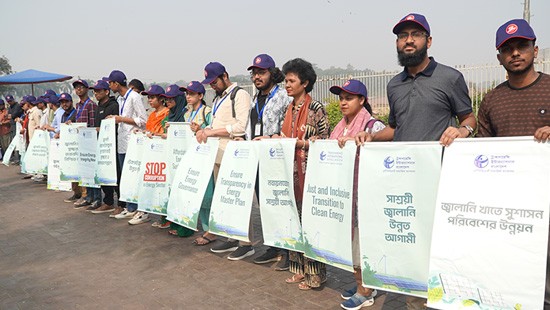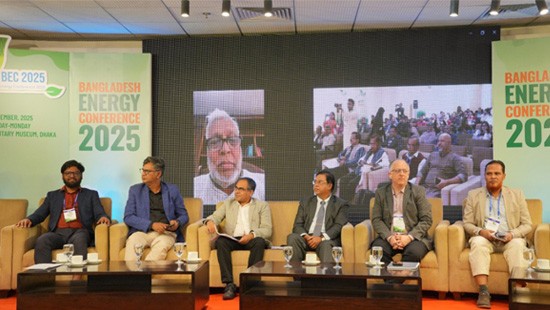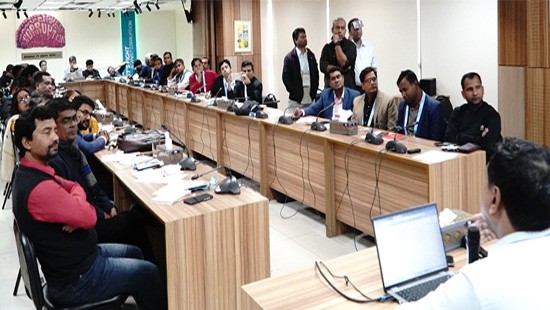Published: 29 January 2019
Bangladesh scored 26 on a scale of 0-100 among 180 countries in the Transparency International’s (TI) Corruption Perceptions Index (CPI) 2018. Bangladesh’s score has moved downward by 2 points than last years’ position in the index, which ranks 180 countries and territories by their perceived levels of public sector corruption, placed Bangladesh 149th from the top and 13th from the bottom. In the 2017, Bangladesh was in 143rd from the top and 17th from the bottom. This score is much lower than the global average score of 43 and both in rank and score among eight South Asian countries, Bangladesh’s position remains 2nd lowest for 6th consecutive years - lower than all except Afghanistan. According to TI Bangladesh, this performance portrays prevalence of worrying level of corruption in Bangladesh. Against this backdrop, TI Bangladesh called upon the government to take a stricter position and effective measures in realizing its political commitment to prevent corruption.

On the occasion of the global release of CPI 2018, in a press conference held today at its head office in Dhaka this morning Dr. Iftekharuzzaman, Executive Director of TI Bangladesh presented the global findings and explained Bangladesh’s score and other matters related to it. Produced by the Research team of TI-Secretariat, the 2018 Corruption Perceptions Index (CPI) by Transparency International reveals that the continued failure of most countries to significantly control corruption is contributing to a crisis of democracy around the world.
Mentioning Bangladesh’s performance as embarrassing, Dr. Zaman termed it as `steepest fall in a single year since 2008 (same as in 2014 when the score fell from 27 in 2013 to 25).’ Bangladesh is positioned among more than two-thirds of 180 countries who scored below 50 and secured 4th lowest position among 31 Asia-Pacific countries. Other countries who scored the same with Bangladesh are Central African Republic and Uganda, added Dr. Zaman.
According to CPI 2018, among South Asian countries, Bhutan is on the top (score 68, rank 25 from top) while Afghanistan remains in the bottom scoring only 16 with 172nd position which is globally the fourth lowest, and 2nd lowest in the Asia-pacific region. Except Bhutan, all South Asian countries have received lower than the global average of 43. India ranked 78th with a score of 41. Sri Lanka scored 38 with 89th in the rank, followed by Pakistan that scored 33 with 117th position. Maldives and Nepal jointly share 124th position scoring 31. Afghanistan ranked 172nd with score of 16. Denmark and New Zealand top the CPI 2018 with 88 and 87 points, respectively. Somalia, South Sudan, and Syria are at the bottom of the index, with 10, 13 and 13 points, respectively.

Dr. Iftekharuzzaman said, “Bangladesh could have performed better as it has ability and efficiency enough to do so. One of the factors which might have contributed to Bangladesh’s poor performance in the global index, is lack of effective implementation of anti-corruption commitment or political will though we do have such declarations. Among others, especially factors like rarely addressed high-profile corruption, pervasive conflict of interest - political and government position perceived as means of enrichment, unabated financial and banking sector crisis including loan default and bank fraud , grabbing of land, river & water bodies, political control of contracting & recruitment business, embarrassingly high and unabated illicit financial transfers; weakening institutions of accountability; deficit in effectiveness and independence of ACC; denial syndrome, impunity - weakening rule of law; shrinking media and civil society space etc might also have contributed to the recent performance.”
Commenting that no country can control corruption instead of political commitment and application by the higher echelon, Dr. Zaman said, ``The recent statements of the Prime Minister (PM) on zero tolerance against corruption, is a reflection of her political will. However, effective implementation of this declaration should be ensured through applying it irrespective of status or identity. For this, it is significant to formulate a national anti-corruption strategy in consultation with relevant experts and stakeholders. If such a versatile and time-bound strategy can be applied in short, medium and long term with fair monitoring, Bangladesh will surely perform well in the global ranking.”
Dr. Zaman further added that because of lack of proper understanding about CPI people of the country are blamed to be corrupt which is not right. “Majority of the people here are not corrupt but rather victims of it and because of the failure of our leadership to fight against the corruption of the powerful echelon they can never be blamed,” Dr. Zaman concluded.

In the press conference, it was also clarified that no nationally generated data, including TI or TIB’s research or that of any other national chapter of TI is considered for the CPI. Unlike TI chapters of other countries, TI Bangladesh releases corruption perception index only. Professor Dr. Sumaiya Khair, Adviser- Executive Management, TIB; Mohammad Rafiqul Hassan, Director-Research & Policy; and Sheikh Manjur-E-Alam, Director-Outreach & Communications, of TI Bangladesh were also present at the meet.
Produced by the Research team of TI-Secretariat and launched in 1995, the Corruption Perceptions Index, Transparency International’s flagship research product, has become the leading global indicator of public sector corruption. The index offers an annual snapshot of the relative degree of corruption by ranking countries and territories from all over the globe. CPI provides international comparison of countries by perceived prevalence of corruption understood in terms of abuse of entrusted power. It is a survey of surveys (13 in 2018) conducted by reputed international organisations. Information used in CPI relates to corruption in the public sector, particularly political and administrative; conflict of interest; unauthorised payment in the delivery of government functions, and in justice, executive, law enforcement and tax collection. The government's capacity to control corruption is also considered. In 2012, Transparency International revised the methodology used to construct the index to allow for comparison of scores from one year to the next.
For more information on result and analysis of Bangladesh in CPI , Please click here. For recorded video of the press conference on CPI 2018 release, Please click on the convenient platform (Facebook, Youtube). For global results and analysis, please visit here.






